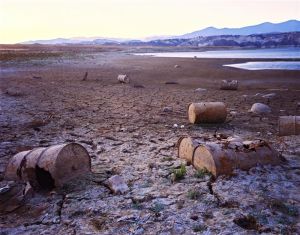Environmental Protection
 These oil barrels were dumped in a lake in Russia (Photo: GettyImages)Several effects on the environment are linked to the different stages of oil extraction. Terrestrial, avian and marine fauna, flora and humans are all potentially affected when oil is sought. Below is an overview of the most prominent environmental challenges.
These oil barrels were dumped in a lake in Russia (Photo: GettyImages)Several effects on the environment are linked to the different stages of oil extraction. Terrestrial, avian and marine fauna, flora and humans are all potentially affected when oil is sought. Below is an overview of the most prominent environmental challenges.
Prospection stage: To find offshore oil reserves, seismic waves are sent into the ground. These can under certain circumstances disorient marine life. The waves can disrupt the sonar that whales and dolphins use for orientation and can lead to whales beaching.
Effects of Infrastructure: Oil drilling has enormous infrastructure requirements. Large-scale transportation networks need to be build, including roads, harbour-facilities and pipelines. These installations can easily disrupt wildlife and erode vegetation threatening the breeding grounds of reindeer, caribou and polar bears. Nature and numerous other species can as well be affected when building roads and pipelines on shore.
Danger of Spills: Oil pollution is difficult to clean up. The Arctic has seen major oil disasters, most prominent being the "Exxon Valdez" tank ship accident in 1989.The accident happined on March 24th 1989 when around 40.000 m3 of oil leaked into the Prince William Sound in Alaska. The ship gashed its hull when it clashed into a reef, contaminating 1,300 miles of shoreline and stretching over 470 miles from the crash site. Countless fish, along with more than 250,000 seabirds and thousands of otters and seals perished.
But the largest ever oil spill in the Arctic occurred in the Usinsk region of the Komi Republic in Russia in 1994. Out of an estimated 100.000 m3 spilled, around one third is still trapped to present day in bogs and local ecosystems around the site. The pipeline just south of the Arctic Circle had been leaking since February 1994 but the oil was contained within a dike built for this purpose.
On October 1st, the dike collapsed because of cold and snow. Following the collapse, around 102,000 tones of oil began to pour onto the Siberian tundra. The spill reached the Kolva River, a tributary of the Pechora River, which falls into the Barents Sea. Life within the rivers as well as the fragile environment of the Artic have been endangered by this oil spill. Experts estimate the spill to be eight times greater than the Exxon Valdez oil spill.
These examples show the danger of oil spills. They are a threat to the food chain of humans as well. Animals in contact with oil can contract cancer. Genetic damage in form of slow development, abnormalities of embryos and larvae have also been observed. Animals with feathers or fur can suffer a considerable reduction of the isolative capacity.
The oil spills can also result in a painful death of the animal directly from cold or indirectly through a lack of food and thus energy to keep warm. Cleanup and long term effects can sometimes last for decades. Benthic environments usually recover from oil accidents within 1–10 years. Different species, however, have different sensitivities and recovery times.
Wastewater / by-product of production: Wastewater is created as a by-product of oil drilling. It contains so-called polycyclic aromatic hydrocarbons, which are lethal to marine life in high concentration and can cause birth defects or impaired growth in lower concentrations. This can also lead to increased risk of cancer in humans who eat defect fish, like happened in Catalunia in Spain in 2005.
Sludge / by-product of production: Yet another by-product of oil drilling is the mud, slimes and sludge's containing TENORM (technologically enhanced naturally occurring radioactive material). Methods of disposing this sludge are land-farming and tailing ponds. This again can prove to be fatal to migratory birds. When people happen to inhale radon gas coming from the sludge, they are also in risk of contracting lung cancer.








